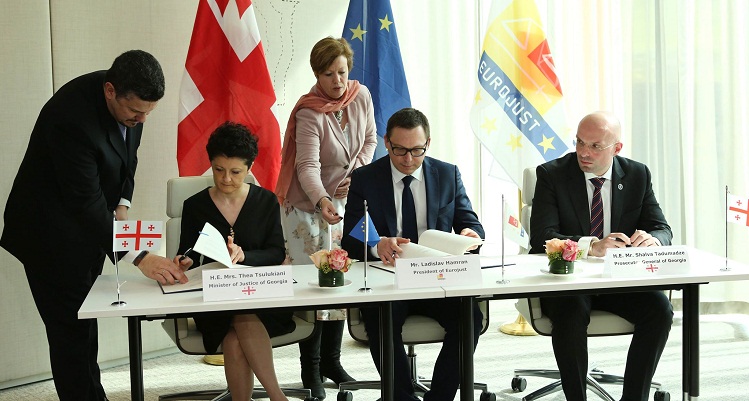Georgia is the first in S. Caucasus becoming member of Eurojust

The signing ceremony was held in the Hague today. Photo: Justice Ministry press office.
Georgia has become the first country in the South Caucasus which signed an agreement with the EU agency Eurojust , created in 2002 to help EU member and several non-member countries cooperate more effectively to combat terrorism and serious crimes, the Georgian Justice Ministry reports.
Negotiations regarding the agreement kicked off in 2015 which was led by Justice Ministry from Georgia.
The final document was signed in the Hague earlier today by Georgian Justice Minister Thea Tsulukiani, Chief Prosecutor Shalva Tadumadze and the head of Eurojust Ladislav Hamran.
Georgian Minister of Justice H.E. Ms Thea Tsulukiani and @Eurojust President Ladislav Hamran just signed a cooperation agreement, enabling speedy exchange of information and evidence in the fight against organized crime: https://t.co/gk50z2Hhg3 #EUProtects pic.twitter.com/UBAQfsDdJJ
— Eurojust (@Eurojust) March 29, 2019
Hamran thanked the Georgian Justice Minister for her efforts and stated that the Eurojust has received a reliable member.
It is an important date. Georgia will now be able to effectively cooperate with 28 EU member states to combat certain crimes,” Hamhan said.
Georgian Justice Minister Thea Tsulukiani stated that the agreement will particularly help Georgia preserve the EU-Georgia visa-free deal.
With the help of the agreement, we believe to create problems for the Georgians who leave for the EU to commit crimes there and create threats to the EU-Georgia visa free deal,” Tsulukiani said.
The Justice Ministry says that the agreement will provide opportunities for Georgia and the EU member countries to cooperate more effective and in timely manner during the investigation process of serious crimes, this particularly concerns organised and transnational crimes.
- The European Parliament held a vote regarding the issue and its 555 legislators supported the signing of the deal between Georgia and the Eurojust back in February 2019.
- In March 2019 the Council of Europe also approved the agreement and confirmed the agreement project.
- Before making the decision regarding the signing of the agreement Eurojust had studied “in depth” how the Georgian law enforcement agencies protect personal information.
The ministry says that signing the deal means that the Georgian justice system-investigative agencies, the Prosecutor’s Office and the court, are in line with European standards
Each year, Eurojust opens a growing number of cases [currently over 2,300] and holds about 250 coordination meetings and runs 10 coordination centres, the Eurojust press office reads.
 Tweet
Tweet  Share
Share